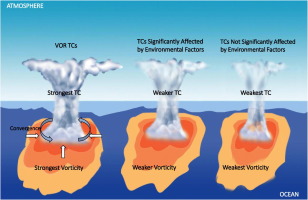当前位置:
X-MOL 学术
›
Atmos. Res.
›
论文详情
Our official English website, www.x-mol.net, welcomes your
feedback! (Note: you will need to create a separate account there.)
Relative vorticity is the major environmental factor controlling tropical cyclone intensification over the Western North Pacific
Atmospheric Research ( IF 4.5 ) Pub Date : 2020-06-01 , DOI: 10.1016/j.atmosres.2020.104874 Yusi Wu , Shumin Chen , Weibiao Li , Rong Fang , Haoya Liu
Atmospheric Research ( IF 4.5 ) Pub Date : 2020-06-01 , DOI: 10.1016/j.atmosres.2020.104874 Yusi Wu , Shumin Chen , Weibiao Li , Rong Fang , Haoya Liu

|
Abstract The forecasting skill of tropical cyclone (TC) intensity has improved slowly over recent decades. The focus of this study was environmental vorticity, which is one of the dominant atmospheric factors controlling TC intensity, because few previous studies have investigated the quantitative contribution of environmental vorticity to the intensification of the majority of TCs. Stepwise multiple regression was applied to correlations between TC intensity and various environmental factors during the intensification stages of 181 TCs, active over the western North Pacific during July–October of 2003–2017. Results showed that almost 71% of TCs were significantly affected by various environmental factors, with more than half (approximately 53%) being dominantly affected by environmental relative vorticity at 850 hPa (hereafter classified as VOR TCs). Comparison of the average minimum sea level pressures showed that VOR TCs were relatively stronger than all TCs significantly affected by other environmental factors, which were in turn stronger than those not significantly affected by environmental factors. Average enhancement of environmental vorticity in VOR TCs, corresponding to TC intensification, was relatively large compared with TCs significantly affected by other environmental factors. A vorticity diagnostic analysis showed that the Coriolis divergence term and vorticity divergence term were the main sources of enhancement of environmental vorticity in VOR TCs, having much larger values than other TC types. The additional enhancement of VOR TCs was generated by environmental convergence that was stronger than that in all other TCs of this study.
中文翻译:

相对涡度是控制西北太平洋热带气旋增强的主要环境因素
摘要 近几十年来,热带气旋(TC)强度预报技术进步缓慢。本研究的重点是环境涡度,它是控制 TC 强度的主要大气因素之一,因为以前的研究很少调查环境涡度对大多数 TC 强度的定量贡献。在 2003-2017 年 7 月至 10 月期间活跃于北太平洋西部的 181 个 TC 的强化阶段,逐步多元回归应用于 TC 强度与各种环境因素之间的相关性。结果表明,近 71% 的 TC 受到各种环境因素的显着影响,超过一半(约 53%)主要受 850 hPa 环境相对涡度的影响(以下归类为 VOR TC)。平均最低海平面压力的比较表明,VOR TC 相对强于所有受其他环境因素显着影响的 TC,而后者又强于未受环境因素显着影响的 TC。与受其他环境因素显着影响的 TC 相比,VOR TC 中环境涡度的平均增强,对应于 TC 的增强,相对较大。涡度诊断分析表明,科里奥利散度项和涡度散度项是VOR TCs环境涡度增强的主要来源,其值远大于其他TC类型。
更新日期:2020-06-01
中文翻译:

相对涡度是控制西北太平洋热带气旋增强的主要环境因素
摘要 近几十年来,热带气旋(TC)强度预报技术进步缓慢。本研究的重点是环境涡度,它是控制 TC 强度的主要大气因素之一,因为以前的研究很少调查环境涡度对大多数 TC 强度的定量贡献。在 2003-2017 年 7 月至 10 月期间活跃于北太平洋西部的 181 个 TC 的强化阶段,逐步多元回归应用于 TC 强度与各种环境因素之间的相关性。结果表明,近 71% 的 TC 受到各种环境因素的显着影响,超过一半(约 53%)主要受 850 hPa 环境相对涡度的影响(以下归类为 VOR TC)。平均最低海平面压力的比较表明,VOR TC 相对强于所有受其他环境因素显着影响的 TC,而后者又强于未受环境因素显着影响的 TC。与受其他环境因素显着影响的 TC 相比,VOR TC 中环境涡度的平均增强,对应于 TC 的增强,相对较大。涡度诊断分析表明,科里奥利散度项和涡度散度项是VOR TCs环境涡度增强的主要来源,其值远大于其他TC类型。











































 京公网安备 11010802027423号
京公网安备 11010802027423号